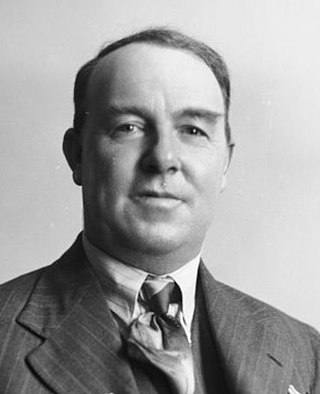Related Research Articles

Vicki Susan Buck is a New Zealand politician. She was Mayor of Christchurch for nine years from 1989 to 1998. She retired after three terms, having been very popular. She made a political comeback, standing in the 2013 local elections in the Riccarton-Wigram ward as councillor for Christchurch City Council, being returned with the highest number of votes across all city wards. She subsequently accepted the role of deputy mayor.

John Walton Beanland was a building contractor and Mayor of Christchurch from 1936 to 1938.

John Joseph Dougall was Mayor of Christchurch in 1911–1912. He was a solicitor by profession. In his later life, the Navy League was his main interest.

The Christchurch mayoral by-election in 1936 was triggered by the resignation of the incumbent, Dan Sullivan, who had been appointed cabinet minister after the Labour Party winning the general election in November 1935. The election was won by John Beanland of the Citizens' Association, who narrowly beat the Labour candidate.
The Wellington Citizens' Association, was a right-leaning local body electoral ticket in Wellington, New Zealand. It was formed in 1911 by merging the selection process of council candidates of several civic interest groups and business lobby groups. Its main ambitions were to continue to control the Wellington City Council, reduce local spending and deny left-leaning Labour Party candidates being elected.

The 1959 Wellington City mayoral election was part of the New Zealand local elections held that same year. In 1959, elections were held for the Mayor of Wellington plus other local government positions including fifteen city councillors. The polling was conducted using the standard first-past-the-post electoral method.

The 1980 Christchurch mayoral election was part of the New Zealand local elections held that same year. In 1980, election were held for the Mayor of Christchurch plus other local government positions. The polling was conducted using the standard first-past-the-post electoral method.
The 1959 Christchurch mayoral election was part of the New Zealand local elections held that same year. In 1959, election were held for the Mayor of Christchurch plus other local government positions. The polling was conducted using the standard first-past-the-post electoral method.

The 1971 Christchurch mayoral election was part of the New Zealand local elections held that same year. In 1971, elections were held for the Mayor of Christchurch plus other local government positions. The polling was conducted using the standard first-past-the-post electoral method. The incumbent, Ron Guthrey of the Citizens' ticket, was defeated by the Labour Party candidate Neville Pickering.

The 1974 Christchurch mayoral election was part of the New Zealand local elections held that same year. In 1974, election were held for the Mayor of Christchurch plus other local government positions. The polling was conducted using the standard first-past-the-post electoral method. A significant change was the introduction of a ward system, with city councillors elected in five wards.

The 1977 Christchurch mayoral election was part of the New Zealand local elections held that same year. In 1977, election were held for the Mayor of Christchurch plus other local government positions. The polling was conducted using the standard first-past-the-post electoral method.

The 1983 Christchurch mayoral election was part of the New Zealand local elections held that same year. In 1983, election were held for the Mayor of Christchurch plus other local government positions. The polling was conducted using the standard first-past-the-post electoral method.

The 1986 Christchurch mayoral election was part of the New Zealand local elections held that same year. In 1986, election were held for the Mayor of Christchurch plus other local government positions. The polling was conducted using the standard first-past-the-post electoral method.

The 1989 Christchurch mayoral election was part of the New Zealand local elections held that same year. In 1989, election were held for the Mayor of Christchurch plus other local government positions. The polling was conducted using the standard first-past-the-post voting method.

The 1938 Christchurch City mayoral election was held on 11 May. The incumbent, John Beanland of the Citizens' Association, failed to get the nomination by his party and the surgeon Dr. John Guthrie was nominated instead. The Labour Party nominated Robert Macfarlane. Both the Labour and conservative candidate had been members of Christchurch City Council for some years. Macfarlane narrowly won the mayoralty.

The 1941 Christchurch City mayoral election was held on 17 May. The incumbent, Robert Macfarlane of the Labour Party, did not stand for re-election as he wanted to serve in WWII. Four candidates stood and Ernest Andrews of the conservative Citizens' Association was successful. Andrews was installed on 28 May 1941.
Peter Jensen Reid Skellerup was a New Zealand industrialist and philanthropist.

The 1944 Christchurch City mayoral election was held on 27 May. The incumbent was Ernest Andrews of the conservative Citizens' Association. Andrews was challenged by his predecessor, Robert Macfarlane, of the Labour Party, who had returned from active war service. Andrews won by a large majority.

The 1933 Christchurch mayoral election was part of the New Zealand local elections held that same year. In 1933, election were held for the Mayor of Christchurch plus 16 councillors and other local government positions.
The Lower Hutt Citizens' Association, was a right-leaning local body electoral ticket in Lower Hutt, New Zealand. It was formed in 1945 by merging the selection process of council candidates of several civic interest groups and business lobby groups. Its main ambitions were to continue to control the Lower Hutt City Council, reduce local spending and deny left-leaning Labour Party candidates election.
References
- Clark, Jacinta Therese (1981). Labour Party Politics in Local Government - A Case Study of the Christchurch City Council (MA thesis). University of Canterbury.
- Hyslop, David (1973). The Christchurch Citizens' Association: History, Organization and Decision-making (MA thesis). University of Canterbury.